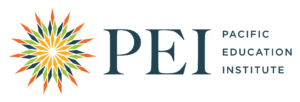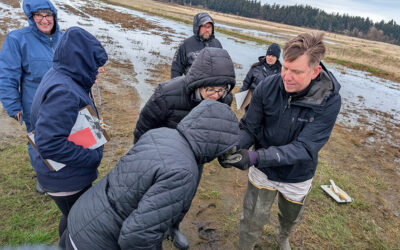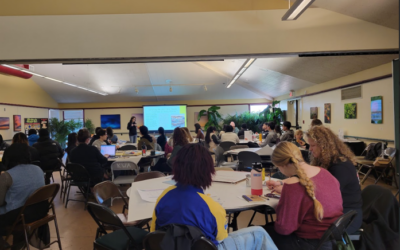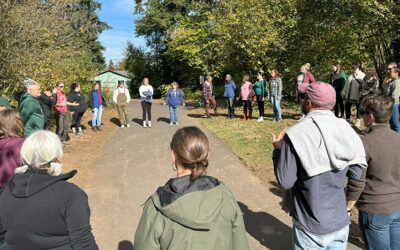Pacific Education Institute
Pacific Education Institute’s (PEI) project, “Solutions Oriented Learning Storylines (SOLS),” is designed to strengthen teachers’ equitable climate science instruction through locally relevant storylines.
All storylines are designed around six guiding principles:
- Centering Indigenous ways of knowing and discussing strategies to learn about and work with local tribes
- Using 3-D NGSS assessment tools to demonstrate student growth
- Gaining strategies and tools for using formative assessment to strengthen inclusive teacher instruction
- Focusing on locally relevant, place-based topics
- Examining and implementing solutions for drawing down greenhouse gases
- Gaining strategies to elevate student voice
The work is designed to have the following outcomes:
- Increased teacher understanding of locally relevant climate science content and research
- Increased teacher comfort around and preparation for implementing culturally responsive practices for diverse student groups (e.g., Indigenous, multilingual learners, English language learners, migrant, rural, students of color)
- Increased teacher confidence using formative assessment and equitable instructional approaches to guide instruction and report student growth
SOLS successes
In the 2020-2021 school year, PEI continued providing high-quality climate science professional learning opportunities to teachers virtually. For both English and Bilingual SOLS workshops, teachers indicated increased confidence in teaching NGSS climate science topics as a result of SOLS workshops (see below).
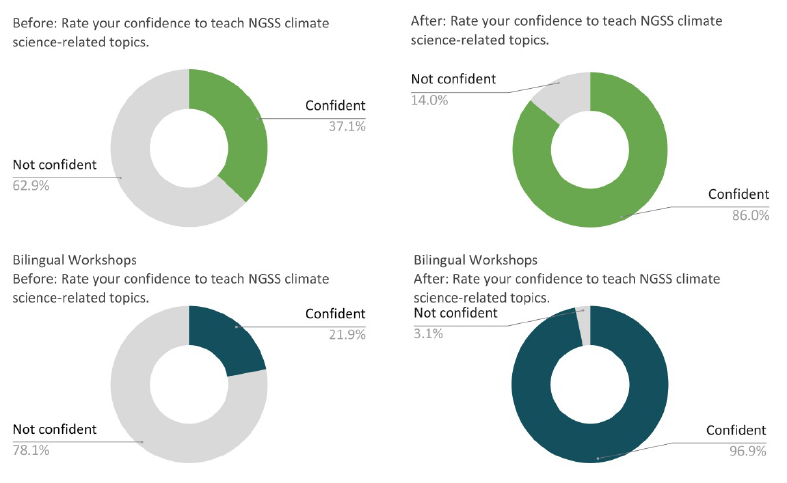
Teachers in English and Bilingual SOLS workshops also reported broadening and deepening their knowledge of instructional practices to make learning experiences more inclusive for Native American students, with 89% (English) and 97% (Bilingual) of participants agreeing or strongly agreeing.
Teacher Professional Learning
SOLS and assessment tools are place-based and locally relevant and designed to help educators demonstrate student growth in NGSS. In each SOLS, students learn about a specific climate science topic and its relationship to the carbon cycle and examine solutions to drawdown greenhouse gases from the atmosphere.
The project targets rural and remote schools and districts that serve high populations of Indigenous students. As of the beginning of the 2021-2022 school year, PEI has offered two Spanish-language workshops and published four SOLS in Spanish: Fire, Forests, Natural Hazards, and Food Waste. Additional SOLS translations will be published in the coming months.
SOLS workshops are also designed to support teachers with the following:
- Engaging local professionals to provide expertise and career-connected learning opportunities
- Modeling 3-D NGSS and culturally responsive instructional practices
- Including and elevating Indigenous experts, perspectives, and concerns as part of the science education community
- Leveraging work in PEI’s FieldSTEM districts to increase access to climate science education
Solutions Oriented Learning Storylines (SOLS) Materials
PEI SOLS can be found at pacificeducationinstitute.org and at the Washington Open Educational Resource Commons (OER) website.
Upcoming Classes
Partners & Collaborators
Cinnamon Bear
Lourdes Flores Skydancer
Indroneil Ganguly
Department of Natural Resources
ESD 105, 113, 123, and 171
Mount Rainer Institute
Olympia Community Solar
Sally Brownfield
Itsa Shash
Port Blakely
Stevens County Conservation District
Lamb Weston
Green Bow Farms
Hood Canal Salmon Enhancement Group
Anderson Hay
City of Vancouver
Muckleshoot Tribal School
Storylines
Success Stories from PEI
The Upside of Erosion and Other Lessons From Padilla Bay Workshop
Is erosion always bad? Eighteen teachers from eleven northwest school districts grappled with this question at an in-person Connecting Communities Through Wetland Education workshop in March, a collaborative effort between Padilla Bay Estuarine Reserve and PEI. The...
Community Education in Action: Building Resilient Communities Through Intergenerational Learning and Storytelling
In the face of escalating climate and sociopolitical challenges, the Community Education in Action program promotes collaborative learning, bringing together diverse voices to bring communities together and co-create educational resources that address climate and...
Taking Learning Outside – a full day kick off for a yearlong series
It was a picture perfect autumn day when educators gathered at Luke Jensen Sports Park's community room for the first session of ESD112's Taking Learning Outside professional learning series. Educators from across Southwest WA joined a panel of experts to learn...

